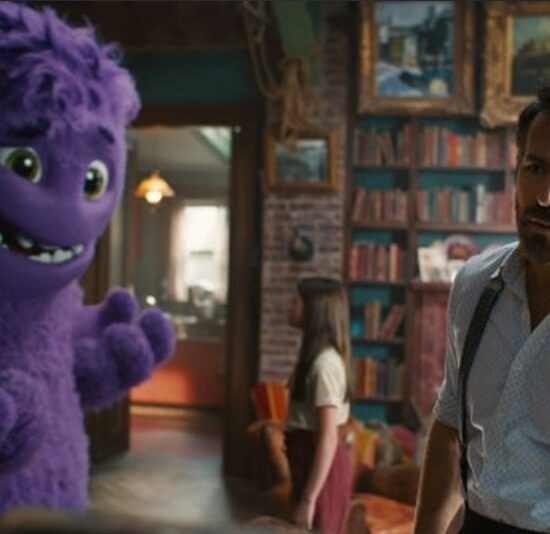
‘Kuthiraivaal’
Trying to summarize or describe this spectacularly zany Tamil mindboggler is a fool’s errand, but I’ll make an attempt: Saravanan (Kalaiyarasan), a young bank employee who also calls himself Freud, wakes up in his apartment in Chennai, in South India, and realizes he has suddenly grown the tail of a horse. Dazed and confused, he wanders around the city avoiding curious stares and trying to seek answers from a “dream interpreter,” a mad mathematician, an astrologer and others. At some point the setting switches to a bucolic village adorned with portraits of the bygone Tamil megastar MGR; at another, the story turns into a murder investigation that draws on Western theorists like Jacques Lacan. Amid all this, Kalaiyarasan walks around with a perpetually confounded face and a pitch-perfect horsetail twitch, and the directors Manoj Leonel Jason and Shyam Sunder play around with psychedelic lights, crazy Dutch angles and dialogue stuffed with riddles and jokes.
It’s utter chaos and yet feels somehow perfectly ordered — like a puzzle that evinces a mysterious, alien logic, but a logic nevertheless. Sunder and Leonel Jason are part of a new generation of young, cinephile Tamil auteurs experimenting inventively with audiovisual form. Much of the joy of “Kuthiraivaal” (horse tail in English) comes from just watching the directors gleefully explore the endless possibilities of the moving image. But like the best of surrealist cinema, the film also evokes, if through mood rather than narrative, a powerful sense of the absurdity of modern life, where the search for meaning feels constant yet pointless.
‘One in a Thousand’
The dilapidated Argentine housing project that provides the setting for Clarisa Navas’s drama evokes both a dystopia and a utopia. The impoverished barrio of Las Mil in Argentina’s Corrientes province — where Navas herself grew up — looks like a forgotten, forsaken place, with its littered streets and shoddy houses. But running around this ghetto is a band of fearless queer teenagers, who spend their time dancing, playing ball, making art and having sex with infectious abandon. It’s the kind of joyful (if still fraught) vision rarely seen in L.G.B.T.Q. movies or movies about ghettos.
Navas populates her film with memorable characters who feel utterly lived-in. The main arc concerns the lesbian high-school dropout Iris, who has been sent to Las Mil to live with her aunt and two gay cousins. Tall and tough yet awkwardly shy, Iris falls for Renata, a somewhat notorious older woman who has just returned to the neighborhood after a stint abroad. Their budding romance is inflected — though never weighed down or made sordid — by local realities of sex work, H.I.V. and violence. Navas’s magic touch is to render these narratives with a naturalistic, often humorous approach, devoid of judgment or pity. Its grimy, gritty atmospherics notwithstanding, her film is a sweet, even romantic portrait of queer love — a love that proudly defies traditional or prejudiced understandings of kinship and community.
‘Mezquite’s Heart’
In a small, rural community of the Yoreme, an Indigenous group in Mexico, the young Lucía (Mayrin Buitimea) dreams of becoming a harpist like her father. Custom holds, however, that women cannot play the instrument. In Ana Laura Calderón’s fable-like feature, this simple premise of tradition versus change flowers into a poignant tale of coming-of-age — not just of Lucía, but also of a marginalized community struggling to hold on to its culture while adapting to the times.
Set in an arid, dust-blown village in northern Mexico and featuring local, nonprofessional actors, “Mezquite’s Heart” is a beautiful showcase for the lives and rituals of the Yoreme. As the town prepares for an annual festival — where Lucía, who has secretly been receiving harp lessons from her grandfather, wants to debut her skills — Calderón revels in scenes of vibrant song-and-dance. In the background, larger political and social battles unfold as Lucía’s family confronts racism, debt and increasing pressures to rent their land to corporations. But “Mezquite’s Heart” never tips into ethnography or issue filmmaking: Buoyed by Buitimea’s childlike wonder, and the Yoreme folklore her character so cherishes, the film unfolds as part-portrait, part-parable.
‘The Perfect Nanny’
Adapted from Leïla Slimani’s best-selling French novel “Chanson Douce,” Lucie Borleteau’s thriller tells the true-crime story of a psychotic nanny with a beguiling blend of pathos and puzzlement. Louise (Karin Viard), the buttoned-up, middle-aged child-minder at the center of the film, is no Mary Poppins, even if at first she seems like a vision of domestic perfection, sent from the heavens to solve the marital problems of the bougie Parisian couple Myriam (Leïla Bekhti) and Paul (Antoine Reinartz).
If you don’t know Slimani’s book or the events that inspired it, “The Perfect Nanny” will keep you on a tightrope, refusing to give away its secrets until the very end. As the film goes on, Louise’s behavior turns odder and odder, but in subtle, inexplicable ways. Is it creepy that she arrives before dawn — and sips coffee alone in the dark kitchen — or is she just industrious? Is there something slightly maniacal about her neatness? Are her convoluted mind games with the children just weird or signs of something worse? Viard maintains the suspense with a superbly sinister performance, her piercing blue eyes conveying joy, sorrow and danger all at once, lending depth and realism to the film even when it takes some less-than-plausible turns.
‘Our Lady of the Nile’
Adapted from Scholastique Mukasonga’s semi-autobiographical novel, “Our Lady of the Nile” zeros in on the wave of anti-Tutsi violence that swept through Rwandan schools, universities and churches in 1973, laying the groundwork for the bloody genocide that would rend the country a little over two decades later. The director Atiq Rahimi distills the complexities of that conflict into a lucid yet nuanced melodrama, told with gravity and panache.
The action unfolds at an elite girls’ boarding school run by Catholic missionaries, which becomes a microcosm for the tensions festering in the outside world of adults. Among the institution’s 10 percent quota of Tutsi students are Virginia and Veronica, who are resented by their Hutu classmate Gloriosa, the daughter of a minister. Opening the film with scenes of the girls’ mischiefs, confidences and petty rivalries, and then tracing the corrosive impact of racial animosities, Rahimi unspools a tragic tale of curdled innocence. Ethnic hatred emerges in the film amid a nexus of factors, not least of which is the colonial and patriarchal influence of the cowardly missionaries and a coffee plantation owner, Mr. Fontenaille, who exoticizes the Tutsi girls. As much a document of a past tragedy as a cautionary tale for our present, the film warns of the slippery slope between political opportunism and irreversible violence, whose brunt is often borne by the blameless.













